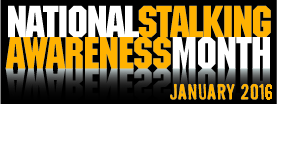
One could argue that last month’s Stalking Awareness Campaign has been one of the strongest campaigns of the 2015-2016 school year. And with good reason, too. The posters and yellow ribbons throughout campus were certainly hard to miss.
“Because January is a short month and there are other major events and campaigns on campus such as MLK Week of Action, the Stalking Awareness Month campaign was more passive than active,” says Title IX Coordinator, Oriana Jimenez. However, the Awareness campaign certainly did not go unnoticed by students.
To get its message across, the campaign also relied on “table tents, awareness messaging on social media, a series of emails with relevant information,” and a well-attended Stalking and Cyberstalking discussion led by a guest speaker from the Harbor House.
The strength of the campaign reflects the severity of the issue. “Stalking is one of the few crimes where early intervention can prevent violence and death.” And, yes, “stalking is an actual CRIME under the law in Florida.”
“As with sexual assault, stalking is often perpetrated by someone you know or have some association with. When the person is known to the victim, he or she may have text messages, emails or other evidence to show proof of the pattern of unwanted attention or harassment on behalf of the stalker.”
It is essential to keep a record of all evidence of stalking. Evidence may range from “text messages, voice messages, emails, date and time stamps of phone calls, phone numbers the person calls from, date, time and location notes of in-person interactions with the stalker, etc.”
The best way to keep track of such information may be through a Stalking Behavior Log. However, some victims may feel pressured to ignore incidents that may qualify as stalking.
Jimenez says, “It is important for students to understand that any behavior by another person, whether you are in a relationship with them or they are a complete stranger, that causes you fear is not normal and should not be acceptable under any circumstances.” If you feel threatened, “trust your instincts.”
If a friend comes to you with concerns regarding a potential stalker, don’t downplay his/her emotions. “Stalking victims/survivors often pull away from family members, friends, and partners for fear of their safety.” Therefore, if stalking becomes an issue, it is important that friends take the initiative to “educate themselves in order to support the victim.”
In a society where “the term ‘stalker’ and its various derivatives are often used in a very casual and flippant manner” people seem to view stalking as a “punchline” rather than the “highly dangerous and serious crime” it is. However, Jiminez does believe that “once students learn about stalking, what it looks like, and why it is so detrimental, they do take it seriously.”
This problem may be a lot closer to home then most would be comfortable admitting: “In fact, individuals 18-24 years of age are the most at-risk age group.” And, just like “it is not an uncommon issue on any college campus, stalking is a problem at Rollins.”
For more information, “an excellent website with resources and support information is http://stalkingawarenessmonth.org/about.”
Extended Q & A with Oriana Jimenez
1. Has stalking been a large problem on the Rollins campus in recent years?
Stalking is a problem at Rollins, but it is not an uncommon issue on any college campus. It is often one of the abusive behaviors that’s associated with dating and domestic violence which is very prevalent and takes many different forms on college campuses nationwide. The aggregate data on the 2014 Student Campus Climate Survey indicated that over 45% of respondents have experienced being frightened, concerned, angered or annoyed by someone making unwanted phone calls or leaving messages. National research suggests that 1 in 4 women and 1 in 13 men will be victims of stalking in their lifetime and in fact, individuals 18-24 years of age are the most at risk age group. In addition, 13% of women report being stalked while at college according to national statistics.
2. What measures has Rollins taken to prevent stalking and cyber-stalking from becoming large issues on campus?
Educating the community about general safety precautions such as being careful of strangers who may be following you or lurking in an area of campus where they shouldn’t be, locking your door when you enter your car or dorm room, and remaining vigilant for any circumstances that may seem potentially dangerous or just “don’t feel right” in some way (i.e. being active bystanders amongst your peers) is always appropriate advice. Bystander Intervention education is key and something that Rollins has incorporated into First Year Student Orientation since 2013.
However, when Rollins does receive a report, we can open an investigation under Title IX. As with sexual assault, stalking is often perpetrated by someone you know or have some association with. When the person is known to the victim, he or she may have text messages, emails or other evidence to show proof of the pattern of unwanted attention or harassment on behalf of the stalker. In cases of cyber-stalking, there is typically some type of “virtual trail” that may lead us directly to the stalker. Rollins is able to take taking reasonable steps to protect a student from online harassment such as imposing a no-contact order (if the stalker is also a student), changing the student’s Rollins email address or blocking the receipt of email messages from the harassers email address, reviewing relevant video camera footage if available, reviewing r-card swipe data if available, or checking a student’s computer or cell phone for spyware. All of these things are steps that can be taken to either find out who the harasser is and/or to protect the student from ongoing harassment by a known individual. In addition, I think it is important to note that stalking is an actual CRIME under the law in Florida; and depending on the extent of the harassment and harm caused to the victim, it can range anywhere from a misdemeanor to a felony. The Title IX Office or Campus Safety can help a student file a report with local law enforcement and answer questions about how to get a legal injunction or restraining order.
3. How can one differentiate between “someone being too familiar” and “stalking?” This would be especially difficult if the issue revolved around cyber-stalking. What are some common signals that potential victims should be made aware of?
I think it is important for students to understand that any behavior by another person, whether you are in a relationship with them or they are a complete stranger, that causes you fear is not normal and should not be acceptable under any circumstances. There are several signs that are good indicators of stalking behavior. It is also important to consider the intensity of such behaviors. Does the person take no for an answer?
- Persistent contact despite being told not to make contact in any form
- Waiting at workplace or in neighborhood
- Verbal threats to harm you, your personal property or pets
- Manipulative behavior (for example: threatening to commit suicide in order to get a response to such an “emergency” in the form of contact)
- Sending written messages: letters, emails, graffiti…
- Sending gifts that are seemingly “romantic” (flowers and/or candy) or bizarre
- Defamation: The stalker often lies to others about the victim (claims of infidelity, for example)
- “Objectification”: The stalker derogates the victim, reducing him/her to an object — this allows the stalker the ability to feel angry with the victim without experiencing empathy
4. If they believe there may be an issue, what actions can students take to protect themselves? Who would one contact in this situation? How would the issue be handled by on-campus parties that become involved?
Stalking is one of the few crimes where early intervention can prevent violence and death. Here are some tips:
- Be extremely careful about posting information online that gives away your location. This is like leaving a trail of breadcrumbs for a stalker to follow right to your doorstep. Think twice before geo-tagging or “checking-in” to your location when you post content online.
- Trust your instincts, if you feel pressured by friends or family to downplay the stalker’s behavior, don’t. Stalking poses a real threat of harm and your safety is the most important thing.
- Call Campus Safety or the police if you feel you are in immediate danger. Explain why even some actions that may seem harmless to others – like leaving you a gift – are causing you fear.
- Keep a record or log of each contact with the stalker. Be sure to also document any police reports.
- Stalkers often use technology to make contact. Save all emails, text messages, photos, and postings on social media sites as evidence of the stalking behavior.
5. How should students react if they have a friend who believes they are being stalked?
Stalking victims/survivors often pull away from family members, friends, and partners for fear of their safety. If someone close to you is being stalked, it is important to educate yourself in order to support the victim. You can help by doing the following:
- Encourage your friend to keep a Stalking Incident Behavior Log. Keep all evidence in the form of text messages, voice messages, emails, date and time stamps of phone calls, phone numbers the person calls from, date, time and location notes of in-person interactions with the stalker, etc.
- Encourage them and do not doubt what they tell you. Because stalking can be harder to prove than other crimes, they may express self-doubt or a loss of a sense of reality. Reassure them that they should not have to put up with someone making them fearful every day and there is help available.
- If the stalker is known, obtain pictures and/or other information about the stalker from the victim/survivor so that you can warn them and help keep track of the stalker’s activities. Ask your friend to provide you with all of the information they have about the person such as their description, including a photo, if they have one, the stalkers contact information, including name, address, phone number, the type of car they drive, etc.
- Screen all calls and visitors for the victim/survivor.
- Do not give away their personal information without their permission no matter how nice or persistent the stalker is about getting the information.
- Never confront the stalker. This will not help the victim/survivor, and may, in fact, increase the danger.
- Be wary of your own safety. Stalkers often threaten or hurt the victim/survivor’s family and friends because they are seen as obstacles.
- Educate yourself about stalking and its consequences.
Stalking is a crime! Contact the police for assistance. On campus, contact Campus Safety at 407-646-2999.







Be First to Comment